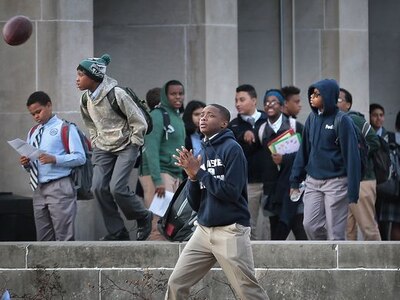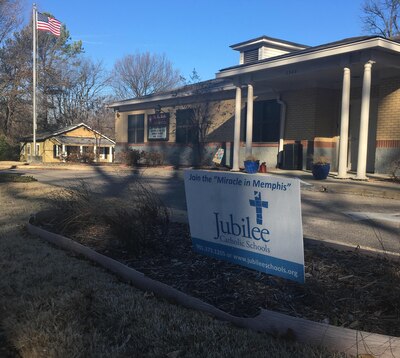The U.S. Department of Education said a charter school network’s lease prohibiting it from teaching anything considered “gravely immoral” by the Catholic Church does not violate federal guidelines, state officials wrote in an email obtained by Chalkbeat.
The federal guidance removes the final hurdle for Compass Community Schools to open its six campuses across Memphis on July 31 in former Catholic school buildings. The opinion also confirms the new network’s eligibility to receive $600,000 per school in federal grants for “promising” new charter schools.
“As presented to the department, the lease provides that the charter school will comply with all applicable federal laws and regulations,” said Liz Hill, of the U.S. Department of Education, in an email to Chalkbeat. “A charter school may lease space from a religious organization so long as the charter school remains non-religious in all respects.”
Other experts suggested the charter network may be vulnerable to a lawsuit.
Preston Green, a University of Connecticut professor, whose 2001 law review article explored the legal questions of churches operating charter schools, said the ban on “gravely immoral” teaching or activities adds up to the church giving orders.
“The church is dictating what is taught or done,” Green said of the Memphis charter network’s lease with the diocese. “That seems like a conflict under the [U.S. Constitution’s] establishment clause to me,” which prohibits the government from favoring a religion.

In late May, state leaders met with James Blew, a senior federal Education Department official who previously worked for groups promoting charters, to discuss the Compass lease, according to a June 10 email to school officials.
Katie Poulos, the state’s chief schools officer, said to him, “we appreciate your guidance that there is no conflict between the department’s guidance … and Compass Community Schools’ lease with the Diocese of Memphis,” according to an email.
Lisa Scruggs, a Chicago lawyer who has helped charter schools and their authorizers, said charter schools may lease from churches. Constitutional limits on the government endorsing a religion come into play only when the church restricts a building’s use based on religious beliefs.
The U.S. Supreme Court has not ruled in scenarios like this and tends to work on a case-by-case basis, she said.
Still, the Memphis case gives Scruggs pause.
“The language on its face — there’s no doubt in my mind it raises serious questions and is something that puts the relationship at risk of more scrutiny and potential litigation,” said Scruggs, who wrote a 2015 guide for charter schools using facilities owned by religious groups for the National Alliance for Public Charter Schools.
She cited the example of a New Jersey charter school that in May was forced to remove student art commemorating gay artist Keith Haring in a Catholic Church-owned building. In ordering the school to remove the mural, a priest cited a provision in the charter school’s lease similar to the morality clause in the Compass Schools’ lease.

With less access to facilities than their traditional school counterparts, charter schools sometimes have to navigate relationships with religious groups, Scruggs said. Among several Memphis charter schools operating in churches, Circles of Success Learning Academy, run by a community development organization in South Memphis, occupies space in St. Andrew’s AME Church.
Scruggs said the federal government might have a constitutionally sound reason for its decision on the lease. But Hill, the Education Department’s spokeswoman, didn’t elaborate on the department’s reasoning, in response to a Chalkbeat email.
The nation’s top education officials also said the Memphis Diocese’s rule barring Compass Community Schools from removing statues, crucifixes, and other religious symbols inside the buildings or covering any symbols outside the building did not conflict with federal regulations.
That point is moot, though, because the previous tenants, Jubilee Catholic Schools Network, already removed all religious symbols from the hallways, classrooms, and cafeterias, said Whitney Albert, a spokeswoman for the charter network.
The Memphis lease has attracted the attention of a national nonprofit that advocates for stricter separation between religious activity and schools. The Center for Inquiry sent a letter to Tennessee’s attorney general in March after the lease agreement controversy first became public.
Nicholas Little, the organization’s vice president and legal director, said he was “extremely concerned” about the restrictions in the leases.
“Such a commitment to a religious group to refrain from teaching children anything which might involve a challenge to a church’s doctrine violates the Constitution,” the letter read. “It is important that the determination of what is taught in our public schools is made by democratic bodies and representatives of all of our people, not by religious groups representing a particular belief system.”
The charter network has said its schools are public and will “adhere to all Tennessee state laws and standards,” according to Poulos’ email.
